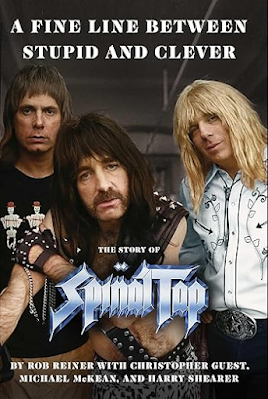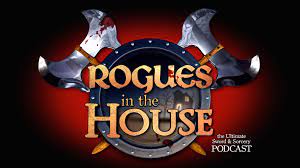But the 70s are also a different, distant country. Things were Weirder then, or at least seemed that way. I don’t believe in ascribing magical properties to arbitrary 10-year windows of time other than to say that if the 60s were the decade of rebellion, the 70s, freed of shackles, were a decade of expression and experimentation.
With the demise of censorship codes and the rise of talented young directors we got some of the best films ever made in the 1970s. Record labels gave unpolished artists the financial freedom and a lengthy creative leash to experiment. The result was heavy metal, punk, … and disco (mistakes were made).
Fantasy fiction was likewise Weird. We had yet to become Sword of Shannara-fied and reading endless series of identical epic quests.
I was listening to a recent episode of the Geeks’ Guide to the Galaxy podcast discussing Flame and Crimson and the history of sword-and-sorcery. Somewhere around the one-hour mark one of the guests—a co-creator of the fine rotoscoped animated S&S film The Spine of Night—observed that the 70s and 80s were possessed of quality where it felt the “guard rails were off” and a reader or viewer felt that anything might happen.
I admire this quality.
Give me Weird.
S&S has a streak of this. Weird fiction predates sword-and-sorcery, originating with Edgar Allan Poe and carried on with Arthur Machen and Algernon Blackwood and H.P. Lovecraft. But it was married to swordplay, probably, with the likes of Lord Dunsany, then continued in works by A. Merritt and Clark Ashton Smith, and on into Jack Vance, Michael Moorcock, Tanith Lee, and Michael Shea. Today you’ll see it in John Fultz and Schuyler Hernstrom, and others.
It’s always been in S&S’ DNA. Howard’s Kull of Atlantis stories, in particular “The Mirrors of Tuzun Thune” and “Striking of the Gong,” are in this tradition. Weird, brooding, dark, unsettling, introspective. They are the heritage of Weird Tales, the magazine from which S&S was born. If you abide by even a floor definition, its name, S&S needs swords (or a general medieval/pre gunpowder level of tech) and sorcery. Sorcery is not magic. It’s wild, dangerous, malevolent, often catastrophic to user as much as target. Think of a Neanderthal handling a hand grenade and trying to figure out whether to throw pin or charge; that’s sorcery. That’s Weird.
In that era a series of weird S&S stories appeared across publications now largely lost to time. Whispers. Void. Alien Worlds. Fantasy Tales. Weirdbook. These died out in the 80s as high fantasy rose to ascendancy, magic replaced sorcery, and the short story fell out of favor, replaced by epic quest. But for a time weird stories about weird characters drifted through these lost pages, including a wandering knight named Julian.
Darrell Schweitzer’s We Are All Legends collects 13 short stories published between 1970 and 1981. It’s a weird, wonderful little book. The stories take place in medieval Europe but of an uncertain date and place, with permeable borders. Magic has not left the world. It’s studded with Arthurian references, of wounded fisher kings and Merlin and Excalibur, even though its decidedly S&S. It’s dark, both in tone but also subject matter. Julian is haunted by his past sins. He believes he is beyond redemption, his faith in God irrevocably shaken, possibly shattered. “God” if there is one appears to be gnostic demiurge, a flawed, limited, and possibly malevolent creator:
I knew that if God is mad, and the signs show that he is, his Foe is mad also, and there can be no hope for the world between them, for creation is but a battleground for two maniacs in their death struggle.
We Are All Legends ticks a lot of my boxes. Obviously S&S, but also King Arthur, horror (some of these stories appeared in DAW Year’s Best Horror). Stories of anti heroes, even ostensibly peerless knights, grappling with a loss of faith and their own brokenness:
“When I was a child I heard about a man, a very, very old man, whose father had been a werewolf. So they took him, the son, whose father had been a werewolf, and shut him up in a tower. He remained there always, never knowing love, never knowing life. I, too, live in a tower, only mine is invisible and I carry it around with me. Its walls are just as strong though.”
“Are you a werewolf then?”
“Only in my heart.”
Purple and awesome.
Schweitzer would have been in his mid-late 20s writing these stories, which is remarkable. He is very underrated, by me and the community at large, though this YouTuber is a huge fan of the book.
Schweizer confirmed on a Facebook post by Charles Gramlich that the two biggest influences on these stories were Ingar Bergman’s 1957 film, “The Seventh Seal,” and “The Travels of Sir John Mandeville,” a 14th century travelogue (reportedly true) of an English knight into the middle and far east. It doesn’t seem The Life of Sir Aglovale de Galis is among its influences, but We Are All Legends feels something like Clemence Housman’s fine, near forgotten little tale, and its damned, forsaken, wandering knight, a tragic hero. I also noted the influence of Michael Moorock; a possible reference to Corum and the Hand of Kwll. Julian’s wanderings resemble something of a tormented Elric seeking the equilibrium of Tanelorn.
 |
| Fabian... |
… but that is not what Schweitzer was after. He is of the belief fantasy is examining internal conflicts through explicit, external struggles against real-world demons. From an interview on Black Gate:
In your estimation what are the elements that make truly great fantasy fiction? Truly great horror? Is “weird fiction” more than simply a co-mingling of these two genres?
The point of much fantasy is to deal with mythic elements directly, rather than through symbol and metaphor only. You could, for example, write a story about someone who “sells his soul” and makes a “Faustian bargain,” i.e. he sacrifices his personal integrity in an irretrievable manner for some dubious goal-say, success in the Mafia, or in Hollywood, or in politics. It needn’t have any fantastic content, and the Faust symbolism would resonate. But the fantasist’s approach is to bring the actual demon on stage and deal with the material directly.
Schweitzer is a former Weird Tales editor, living elder scholar, and longtime champion of the weird, you can find more of his observations here. Here’s a bit of his learned commentary on the weird and my response.
Of genre categories:
These categories are ultimately marketing tools. Horror is what is published as horror. Fantasy is what is published as fantasy. It’s all about labels and which shelf in the bookstore a book is displayed on. Aesthetically, the distinction is not particularly meaningful.
Believe it or not I an S&S historian agree with some of this. Genre categories began as marketing tools and probably function best that way, less so than tools of analysis. However, I do think having genre parameters or aesthetic template to follow, bend, or break, can produce surprising results and possibly great original art. As can deliberate mixing of genres.
Of the greatness of Tanith Lee (agreed here; we need more Tanith Lee in this world):
Tanith Lee strikes me as the perfect Weird Tales writer, which is probably why WT has published more by her than anyone else. Her work is poetic, sensual, scary, imaginative, erotic if it needs to be. She’s got everything.
And a final hell yeah; I could not agree more with his assessment of the winner take all state of publishing, death of the midlist author, and our need to cultivate more readers:
Forty years ago, you could assume anything in SF/fantasy would sell more like thirty to fifty thousand copies in mass-market paperback without even trying. Just slap the right kind of cover on it and it would sell this acceptable minimum. Well, maybe the ceiling on genre fiction has come off, and today you get an Anne McCaffrey or a Stephen King who can sell millions of copies, but we have also lost the floor, which protected us. Now the major publishers are only interested in writers who have the potential to be the next McCaffrey or King, not the interesting mid-list writers who are worth publishing for what they are, even if they never will sell a million copies — the Davidsons and Laffertys. We have lost our innocence. Once it was demonstrated that SF/fantasy/horror could go to the top of the bestseller lists, anything that doesn’t is now viewed as a failure by those faceless, impersonal Suits who control corporate publishing.
… The U.S.A. has a population of three hundred million. Two thousand copies is not a lot. We have a reading public the size of Luxemborg’s. What any genre needs to stay healthy is more readers and a means of reaching them.








